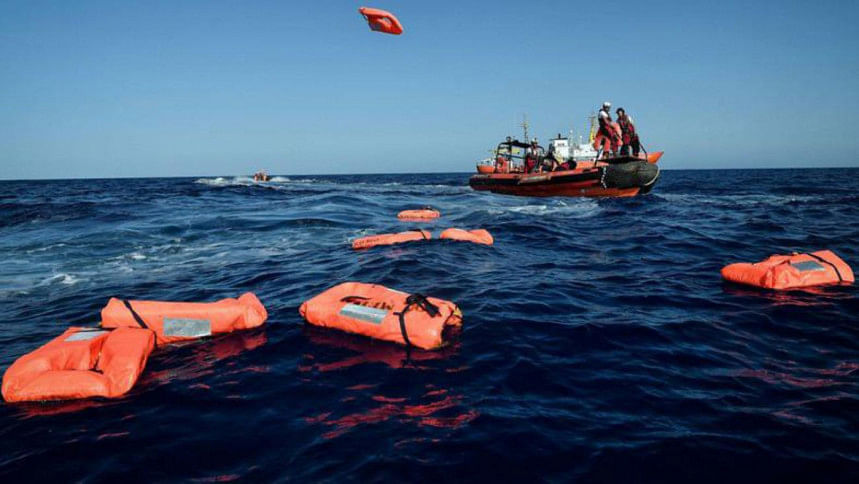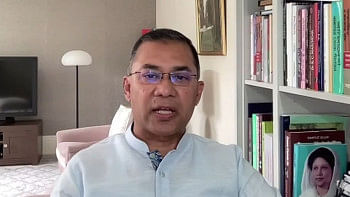Migrant-Boat Capsize in the Mediterranean: Can we stop such tragedies from recurring?

A boat carrying migrants from Libya to Italy sunk in the Mediterranean on May 10, 2019, leaving 37 Bangladeshis dead. In a similar incident this year, 90 migrants died in February, some of whom were Bangladeshis. In fact, the term "Bangladesh" appears frequently in the register of European Border and Coastal Security Agency (Frontex) for undocumented migrants. In UNHCR's account, Bangladesh ranks fourth among the most common nationalities of sea arrivals in Europe as of March 2019. Though Bangladesh has no record of its irregular migrants, the number (if one was to guess) could be more than 100,000 a year.
The question that may puzzle some is: why are so many Bangladeshis gambling their lives to find a better future in developed countries, while the country is neither devastated by war, nor can be called extreme poor—rather is expected to attain middle-income status by 2021.
We all know that the answer partially lies in the growing frustration of people over staying in the country due to limited employment opportunities. This corresponds with national data that shows Bangladesh's unemployment rate increasing in the last years. Most irregular migrants, as evident, belong to the 18-20 age group—when individuals want to start a career with a dignified job. The successful migration stories of their friends and relatives may motivate these youths to migrate to Europe and other western countries.
Nevertheless, western countries have now strengthened their immigration and entry control more than at any other time in the past. Immigration to the west is selectively open only for educated, skilled and professionals who have no record of terrorist involvement. It is not surprising then, why uneducated and unskilled youths would resort to irregular means to find a foothold on western land. I came across many migrants who expressed that they believed it to be worth taking the risk of following irregular pathways, than to remain unemployed for an unforeseen period of time. The cases of failure, deportation, detention and death hardly had any effect on their enthusiasm.
Human smuggling and trafficking are other factors that exacerbate the problem of irregular migration manifold. Human smuggling has become a profitable business since 2010 when people from war-torn Middle Eastern countries started using irregular channels for crossing borders without necessary documents. Bangladeshis have turned into regular clients of human smugglers since 2015.
In other cases, unscrupulous agents and organised criminal groups also lure would-be migrants in Bangladesh and those who work in the Gulf, with attractive jobs and settlement opportunities in the west. I also found migrants who had lost all their savings abroad to intermediaries (dalals) who promised to get them to Italy and Greece. Migration, which was once considered as a "risk minimising" strategy, has now become a risky venture—especially since dangerous and irregular avenues have commonly started to be used by Bangladeshis.
This is indeed a shocking scenario. And we cannot just keep our eyes closed to it. While Bangladesh cannot do much about the structural forces that create division of labour and selective entry of people to different labour markets, it should adopt policies and strategies on a priority basis to prevent young people from taking such perilous journeys. The magnitude of the problem itself implies that awareness campaigns against unsafe migration are not enough to diminish their euphoria about migrating to western lands. Therefore, greater national campaigns should be designed along with community-level interventions. Bangladeshi embassies in the Gulf should run special awareness programmes and drives to protect its workers abroad from being victims of fraud and trafficking.
The country should also declare a war against traffickers and human smugglers. Exemplary punishment should be meted out for committing such crimes through speedy trials as that would help stop migration through irregular pathways. Also, diplomatic efforts should be geared up to instigate bilateral and regional collaboration with a view to destroying the networks of transnational organised trafficking gangs. Return and reintegration of irregular migrants is another critical issue which demands attention. The European Union has already funded a four-year project for sustainable reintegration of deported migrants from Europe which need to be replicated for sustained results.
The country stands on the shoulders of migrants, who sent USD 15.54 billion last year as remittances contributing 7.24 percent of GDP. Yet, as a lower middle-income country, Bangladesh can scarcely survive on the remittances of its "unskilled" migrant workers in the foreseeable future.
Developing skills among young people who are in high demand in the international job market is a viable solution for their dignified employment at home and abroad. Migration cannot be an alternative to creating job opportunities in Bangladesh, yet orderly and safe migration should be ensured for those who wish to make a livelihood abroad. Failure to take effective and immediate steps for the prevention of irregular migration would not only cause recurrent loss of lives in the Mediterranean and elsewhere, but would also severely hinder Bangladesh's journey towards becoming a middle-income country in the near future.
Syeda Rozana Rashid is Associate Professor, Department of International Relations, University of Dhaka.

 For all latest news, follow The Daily Star's Google News channel.
For all latest news, follow The Daily Star's Google News channel. 



Comments